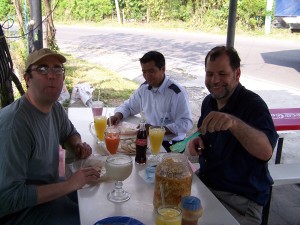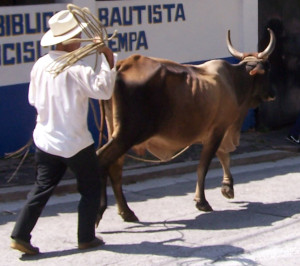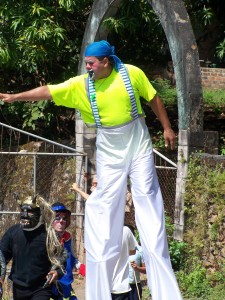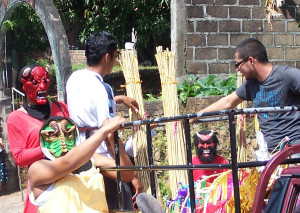Month: October 2010
Arbitrage
“Marijuana domain name values will fly off the charts once Prop 19 passes,” said Mr. Faler, 49. “I’m hoping to make enough money to buy a condo in Morocco. That’s how big it’s going to be.”
Mr. Faler, who lives about 90 miles southeast of Los Angeles in Menifee, Calif., is poised to enter the pets and marijuana market by registering domains like potfordogs.com and marijuanadogbone.com because “dogs get cancer too” he says.
Here is more, interesting throughout. The owner of marijuana.com has been turning down offers for $2 million.
Lydia Davis’s translation of *Madame Bovary*
More on Arrow’s theorem
Dirk writes:
I vote that this post deserves a follow up post with more clarification. If anyone is against this please express your vote with inaction. Us laymen would like to understand this a little better. For the record, the reason I got on a tangent about the law of large numbers was that I watched Boudreaux's lecture and understood it in terms of 3 parties but kept thinking if there were 3000 parties it was unlikely that exactly 1000 would have preference A, 1000 preference B, and 1000 preference C. I guess I'm used to thinking in terms of run-off elections and not the sort in the example. That is why I couldn't grasp why things should "collapse" back to an island situation where n = 2 or 3.
Arnold Kling comments as well and not everyone is happy.
Return to the oft-neglected difference between intra-profile and inter-profile versions of the theorem. Most commentators and expositors have in mind an intra-profile version of the theorem. They set up an example of people and preferences and show how cycling or some other paradox of choice or voting is possible. Observers then wonder whether this cycling is likely as the number of people increases, or as preferences change, and indeed sometimes it is not, as Gordon Tullock pointed out long ago and as Dirk above wonders.
That's interesting stuff, but those fun and practical-sounding expositions are not Arrow's theorem as Arrow wrote it up. Think of Arrow's theorem as modal in nature: "Maybe there is no paradox with current preferences, but there exist possible preferences where everything goes screwy, under any decision rule satisfying a few criteria." Arrow showed that claim is related to something like: "if we apply a specified decision-making procedure across all possible preference configurations, consistent application means the same person gets her way each time."
That's called Arrovian dicatorship, but it does not have to be either harmful or unjust or not even necessarily undemocratic. It just means that one person — the same person — is always getting her first choice, across these modal worlds with differing preference configurations.
This more metaphysical and more originally Arrovian version of the theorem is perhaps why Arnold Kling finds it difficult to apply the theorem to practical problems. It is not about the likelihood or relevance of cycling (though it is a jumping-off point for those analyses). It is instead a deep result about the implications of consistency, combined with limited information about the value of ordinally ranked outcomes.
The intra-profile versions are still important. For intra-profile versions of Arrow, start with Kemp and Ng (1976). Here is a good summary article on that literature. Samuelson, by the way, remained somewhat recalcitrant when it came to the theorem.
Allowing in even limited amounts of interpersonal comparability defuses the paradox, as shown by Kevin Roberts (ReStud, 1980) and Amartya Sen (see the essays in Choice, Measurement, and Welfare). That said, interpersonability can lead to other paradoxes, as shown by Derek Parfit and his Repugnant Conclusion. Paradoxes everywhere, and you must choose which ones to live with.
I take the practical upshot of Arrow's interprofile theorem to be this: when you make a judgment, it is our assessment of the interpersonal comparisons (or intersport importance comparisons, for scoring a decathlon) which is doing all the work. Be very careful with those.
Neither Tullock nor Samuelson was happy with Arrow's theorem, especially when it came to practical implications, so it is fine if you wish to add your name to that list. But I also think they each missed Arrow's point a bit and that of the major economists of his time he was probably the deepest thinker, albeit not the best practical thinker.
Assorted links
The mimic octopus
1:49 of wow.
You can read more here about the mimic octopus.
For the pointer I thank Chris F. Masse.
Assorted links
Rashomon day
Or should I say El Salvador day? Tyler, Alex, and Garett Jones all give their impressions of a recent three-day trip together. These posts are data in a number of ways, yet you need not obsess over esoteric meanings.
El Salvador observations
The best meal was whipped yucca with chicharrón and vinegar, sold next to Tazumal. The ubiquity of corn products means the country has less culinary variety than any of the other eighty lands I have visited. There is a Taiwanese restaurant in San Salvador, however. Olocuilta is a pupusa paradise — go there from the airport.
In Suchitoto, Garett bought a first-rate tortilla for 5 cents and had trouble changing his one dollar bill. If Mankiw abolished the penny, how would the country — which uses the U.S. dollar — cope? Or would they keep pennies as legal tender and all pennies would flow there? How small would a country have to be, to experience hyperinflation from such an influx? Could they put up a penny barrier?
El Salvador has good infrastructure (real roads), the electricity always runs, and the country embodies petty bourgeois values. It is much richer than Nicaragua, Honduras, or Guatemala and it feels quite Protestant. The crafts are weak, but volcanoes, lakes, and birds abound. Their economic policies are quite good, and therein one sees both the potential and limits of economic advice.
On the road, we debated in what year the United States attained current El Salvadoran living standards (measured at $4400-$5800); I thought by the late 1920s. The existence of penicillin makes the numerical comparison difficult, though in favor of El Salvador.
We saw a dead guy on the side of the highway; apparently he was struck down by a passing car. Ill-advised pedestrian walks are a problem for many El Salvadorans in the United States as well. “More guns, less crime” I joked to Alex as we drove through the center city.
It is an excellent country for a three-day trip.
Cash Back in El Salvador
Alex, Tyler and I rented a boat and our captain took us to a Salvadoran village, San Francisco, maybe 500 people.
Speaking Spanish, our captain told us, "The majority of the people from this town are in the United States." They sent back remittances, which explained the remodeled homes, the satellite dishes, the schoolchildren buying ice cream.
I thought about Richard Rogerson's paper, "Indivisible Labor, Lotteries, and Equilibrium."
Rogerson said that there's a high fixed cost of going to work (commuting time, putting on your game face). So people's work lives will tend to be all-or-nothing: 40 hours or zero hours.
In that kind of world, it's more efficient for half the population to work full-time rather for the whole population to work half-time; why should everyone have to get up early?
Rogerson shows such people would rather have a work lottery: The people who draw the short straws have to go to work and have to share their cash with everyone who didn't work.
The people of San Francisco are living in Rogerson's world: One family member draws the short straw and has to go work in the U.S. She sends back most of her money, some of which is used to build a vacation/retirement home for the unlucky worker (A Philippine example here).
There is good work on the micro-level causes of remittances: Stark and Lucas for example. But the social causes are underresearched. One study surveyed here found that even controlling for the usual individual factors, what mattered most was what town you were from.
Key quotes:
“[W]hatever factors governed migrants’ decisions, they operated at the community level"
"[F]urther research is required on the social determinants of remittances"
Rogerson's model is often right, we just don't know why.
Adventures in El Salvador
Tyler, Garett Jones and I visited El Salvador for a few days, just for fun. Here is a travelogue of some of our adventures.
The moment we exit customs Tyler grabs a driver and starts speaking in rapid Spanish. Neither Garett nor I are fluent but we are laughing because we know exactly what  Tyler is saying. Tyler wants pupusas and not pupasas turÃsticos but estilo familiar. The driver understands as well so we jump into his van and he brings us to a pueblo with about 8 or 9 pupuserÃas in direct competition–we learn later that this is the town speciality. We get Pupusas de chicharrones, queso and lorocco, a herb that is hard to find in the United States. Bien Gusto. Tyler is sated so we continue on to Suchitoto, the small colonial town that will be our base of operations.
Tyler is saying. Tyler wants pupusas and not pupasas turÃsticos but estilo familiar. The driver understands as well so we jump into his van and he brings us to a pueblo with about 8 or 9 pupuserÃas in direct competition–we learn later that this is the town speciality. We get Pupusas de chicharrones, queso and lorocco, a herb that is hard to find in the United States. Bien Gusto. Tyler is sated so we continue on to Suchitoto, the small colonial town that will be our base of operations.
The next day we take a boat tour of Lake Suchitlan, an artificial lake nestled among hills and volcanoes. We ask our guide  to take us to a local village–it’s an unusual request but we are the only tourists in town so why not.
to take us to a local village–it’s an unusual request but we are the only tourists in town so why not.
We climb a long hill, it’s blazing hot but we have a look around, get a drink and having seen all there is to see start to head back down to the boat. That’s when we hear the sirens and gunshots–other people hear it as well and stop walking. Only now do I remember the advice from Apocalypse Now, “Never get out of the boat!”
Tyler asks the guide what is going on. He isn’t sure either but he asks a local and tells Tyler it’s “the running.” Tyler is puzzled and looks as confused as I am–this is not a good sign–the word has many meanings, it could be the running of the bulls, the running of the race, the running? Well it seems not to be gunshots so I joke to Tyler that it would be awesome if it were the running of the bulls.
Not 15 seconds later I turn around and I am confronted with an angry bull bearing down on me. It looks like this:

Tyler, Garett and I jump out of the way. What the hell is going on?! With a second or two to recover, I realize the bull is being driven by a gaucho. The bull is snorting and none too happy, the sirens and shots are making it skittish, but the guacho slaps it hard, gets it under control and then, as if in a dream, the gaucho and bull vanish around the corner. We breathe a sigh of relief.

The running of the bull–as Tyler, Garett and I have coined the event–however, was not the running.
It was at about this time that things started to get a little surreal.
 The sirens are approaching, the “gunshots” are getting louder and we see a strangely dressed man coming up the hill towards us. He appears to be tall, very tall, wait…am I in a Fellini movie?
The sirens are approaching, the “gunshots” are getting louder and we see a strangely dressed man coming up the hill towards us. He appears to be tall, very tall, wait…am I in a Fellini movie?
The man is on stilts and is accompanied by a coterie of devils.
As the group passes, we are handed a handsome annual report with pictures of the mayor and the year’s accomplishments. Ah, this is fiscal policy! Now we understand.
We head back to the boat, pleased with our luck and well satisfied with the day’s events. 
Addendum: If you go here are few practical things to bear in mind. El Salvador is not geared towards tourists–this has positive and negative aspects. On the positive side you can believe the prices you are quoted, there is not yet a “take the tourist for all they are worth” culture. On the negative side, there isn’t much to buy. There aren’t many indigenous people and, in part because there isn’t a tourist market, there isn’t a strong artisinal culture, as there is in say Guatemala. There are a few Mayan ruins but nothing as extensive as in Guatemala or Mexico. Few people speak English, even at hotels and restaurants. The pupasas are great but the food variety is limited. We were perfectly happy exploring for two days but this is one of the less exotic countries of Central America.
(By the way, do you see the devil at right, so oddly framed between the bars of the truck. Why is he looking at me this way?)
 We stayed in Suchitoto at a small (6-8 room) hotel called Los Almendros de San Lorenzo. It’s run by a former El Savadorean diplomat who lived 30 years abroad and his partner, an interior decorator. Highly luxurious and recommended but anomalous, don’t take this as representing Suchitoto.
We stayed in Suchitoto at a small (6-8 room) hotel called Los Almendros de San Lorenzo. It’s run by a former El Savadorean diplomat who lived 30 years abroad and his partner, an interior decorator. Highly luxurious and recommended but anomalous, don’t take this as representing Suchitoto.
El Salvador has a very high murder rate, more than 10 times the US rate. Suchitoto, however, is safe and San Salvador seems fine for walking around in the main sections although every shop with anything of value has a guy with a shotgun standing outside.
On the way back from the village after the boat ride we were going to take the bus back into town. We asked some locales where the bus stop was and they volunteered to give us a ride in the back of their truck. Here’s a nice photo of Tyler (taken by Garett) as we traveled the bumpy road back into town. I believe we discussed Mundell and optimum currency areas.

Tales of moral hazard from Vernon, Florida
"There was another man who took out insurance with 28 or 38 companies," said Murray Armstrong, an insurance official for Liberty National. "He was a farmer and ordinarily drove around the farm in his stick shift pickup. This day – the day of the accident – he drove his wife's automatic transmission car and he lost his left foot. If he'd been driving his pickup, he'd have had to use that foot for the clutch. He also had a tourniquet in his pocket. We asked why he had it and he said, 'Snakes. In case of snake bite.' He'd taken out so much insurance he was paying premiums that cost more than his income. He wasn't poor, either. Middle class. He collected more than $1-million from all the companies. It was hard to make a jury believe a man would shoot off his foot."
The full story is here and I thank Noah Veltman for the pointer.
The gridlock myth?
Michael Barone, who has an encyclopaedic knowledge of American politics, writes:
The evidence suggests that partisan polarization in the absence of supermajorities does not cause gridlock. What can and has caused it on so many important domestic policy issues has been electoral volatility. From the TARP example to a raft of others, it is clear that as long as enough congressional members with safe seats are prepared to hammer out deals across party and ideological lines, significant legislation can pass.
That is from the November/December 2010 issue of The American Interest.
Assorted links
Popularizing Arrow’s Theorem II
Arnold Kling is not satisfied with Tyler’s popularization of Arrow’s impossibility theorem asking (in the comments) “what exactly did Arrow show was impossible?” Here is my attempt.
- Andy walks into an ice-cream shop and seeing that they have chocolate, strawberry and vanilla, orders chocolate. Before the vendor has a chance to scoop the ice cream she says, “Sorry, we are out of strawberry.” “In that case,” Andy says, “I’ll have vanilla.” Strange right? Yet however strange we might think this behavior is for Andy it is routine when groups make choices (just substitute Bush, Nader, and Gore for chocolate, strawberry and vanilla.) (Failure of IIA.)
- Andy likes sprinkles on his ice cream. Andy walks into the ice-cream shop and seeing that they have chocolate, strawberry and vanilla chooses chocolate. Before the vendor has a chance to scoop the ice cream she says “Today, chocolate comes with free sprinkles.” “In that case,” Andy says, “I’ll have vanilla.” Strange right? Yet once again it is easy to show that improving an option can result in a group rejecting that option (n.b. no psychology is involved in this result). (Failure of positive association.)
- Andy walks into a supermarket and is offered apples or bananas and chooses apples. Andy is then offered bananas or coconuts and chooses bananas. Andy is then offered apples or coconuts and Andy chooses coconuts. (A>B, B>C but C>A). Strange right? Not only is this strange, if Andy has preferences like this the supermarket can take all his money with a money pump. Once again, however, it is quite possible for groups to cycle in just this way even if every individual in the group has perfectly normal (transitive) preferences. (Failure of transitivity).
 Paradoxes such as the above have been known for centuries. What Arrow showed is that no decision mechanism can eliminate all of these types of paradoxes. (n.b. Arrow’s theorem actually applies to any mechanism for aggregating any rankings not just voting and not just preferences.) We can tamp down some paradoxes but only at the expense of creating others (or eliminating democracy altogether.)
Paradoxes such as the above have been known for centuries. What Arrow showed is that no decision mechanism can eliminate all of these types of paradoxes. (n.b. Arrow’s theorem actually applies to any mechanism for aggregating any rankings not just voting and not just preferences.) We can tamp down some paradoxes but only at the expense of creating others (or eliminating democracy altogether.)
More generally, what Arrow showed is that group choice (aggregation) is not like individual choice.
Suppose that a person is rational and that we observe their choices. After some time we will come to understand their choices in terms of their underlying preferences (assume stability–this is a thought experiment). We will be able to say, “Ah, I see what this person wants. I understand now why they are choosing in the way that they do. If I were them, I would choose in the same way.”
Arrow showed that when a group chooses, there are no underlying preferences to uncover–not even in theory. In one sense, the theorem is trivial. We know or should always have known that a group doesn’t have preferences anymore than a group smiles. What Arrow showed, however, is that without invoking special cases we can’t even rationalize group choices as if leviathan had preferences. Put differently, the only leviathan that rationalizes group choice has the preferences of a madman.
Chat with a computer, about a free market economy
John – Are you into sports.
[ Af:0 At:10 Sp:0] Sports is not my cup of tea. I prefer intellectual challenges like Go.
John – Who's the world Go champion.
[ Af:0 At:10 Sp:0] Sorry. I can't help you. A celebrity of some sort?
John – Do you play chess?
[ Af:0 At:10 Sp:0] I don't play any games except Go.
John – Can we play Go on here?
[ Af:0 At:10 Sp:0] About playing… Does it make sense to you that we reward athletes more than scientists?
John – Television coverage makes that possible.
[ Af:0 At:10 Sp:0] It's a free market economy. And people value entertainment more than serious things like science and education.
John – And your point is?
One judge thought that "Suzette" was more human than a competing human decoy, but I would have been suspicious of the line about a "free market economy." There is more here, including more of the dialogue, and also here.
I thank Michelle Dawson for the pointer; here is my paper with Michelle on the Turing test.